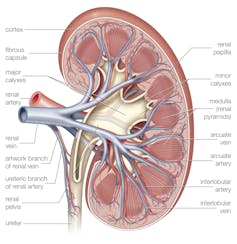
As one of the leading causes of death in the U.S., kidney disease is a serious public health problem. The disease is particularly severe among Black Americans, who are three times more likely than white Americans to develop kidney failure.
While Black people constitute only 12% of the U.S. population, they account for 35% of those with kidney failure. The reason is due in part to the prevalence of diabetes and high blood pressure – the two largest contributors to kidney disease – in the Black community.
Almost 100,000 people in the U.S. are awaiting kidney transplantation. Though Black Americans are more likely to need transplants, they are also less likely to receive them.
Making matters worse, kidneys from Black donors in the U.S. are more likely to be thrown away as a result of a flawed system that erroneously considers all Black donor kidneys as more likely to stop working after a transplant than kidneys from donors of other races.
As a scholar of bioethics, health and philosophy, I believe this flawed system raises serious ethical concerns about justice, fairness and good stewardship of a scarce resource – kidneys.
Table of Contents
How did we get here?
The U.S. organ transplantation system rates donor kidneys using the kidney donor profile index, an algorithm that includes 10 factors, including the donor’s age, height, weight and history of hypertension and diabetes.
Another factor in the algorithm is race.
Research on previous transplants shows that some kidneys donated by Black people are more likely to stop working sooner after transplantation than kidneys donated by people from other races.
This brings down the average time a transplanted kidney from a Black donor can last for a patient.

Encyclopaedia Britannica/UIG Via Getty Images
As a result, kidneys donated by Black people are discarded at higher rates because the algorithm downgrades their quality based on the donor’s race.
This means that some good kidneys may be wasted, raising several ethical and practical concerns.
Risk, race and genetics
Scientists have shown that races are social constructs that are poor indicators of human genetic diversity.
Using a donor’s race assumed people who belong to the same socially constructed group share important biological characteristics despite evidence that there is more genetic variation within racial groups than between other racial groups. Such is the case for Black Americans.
It is possible that the explanation for observed differences in outcomes lies in genetics and not in race.
People who have two copies of certain forms or variants of the APOL1 gene are more likely to develop kidney disease.
About 85% of people with those variants never develop kidney disease, but 15% do. Medical researchers do not yet understand what is behind this difference, but genetics is likely only part of the story. Environment and exposure to certain viruses are also possible explanations.
People who have two copies of the riskier forms of the APOL1 gene almost all have ancestors who came from Africa, especially from West and sub-Saharan Africa. In the U.S., such people typically are categorized as Black or African American.
Research on kidney transplants suggests that kidneys from donors with two copies of the higher-risk APOL1 variants fail at higher rates after transplantation. This could explain the data on Black donor kidney failure rate.
How might this practice change?
Health care professionals decide how limited resources are used and distributed. With that comes an ethical responsibility to steward resources fairly and wisely, which includes preventing unnecessary loss of transplantable kidneys.
Reducing the number of wasted kidneys is important for another reason.

Brendan Smialowski/AFP/GettyImages
Many people agree to organ donations to help others. Black donors may be disturbed to learn that their kidneys are more likely to be discarded because they came from a Black person.
This practice can further decrease the trust of Black Americans in a health care system that has a long history of mistreating Black people.
Making organ transplantation more equitable could be as simple as ignoring race when evaluating donor kidneys, as some medical researchers have proposed.
But this approach would not account for the observed difference in transplantation outcomes and could result in transplanting some kidneys that are at increased risk for early failure due to a genetic issue.
And since Black kidney recipients are more likely to receive kidneys from Black donors, this approach could perpetuate transplant disparities.
Another option that would improve public health and reduce racial health disparities is to identify the factors that lead to some kidneys donated by Black people to fail at higher rates.
One way researchers are working to identify higher risk kidneys is using the APOLLO study, which assesses the impact of key variants on donated kidneys.
In my view, using the variant instead of race likely would decrease the number of kidneys wasted while protecting recipients from kidneys that are likely to stop working sooner after transplantation.
![]()
Ana S. Iltis is a funded investigator on the APOLLO study and receives funding from the National Institutes of Health
























